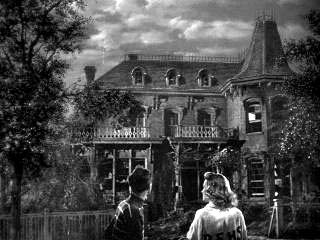The Old Granville House
Over the Holidays I watched it’s A Wonderful Life; best
known for teaching what life is really about and that “when a bell rings an
angle gets its wings”.
But, as a real estate Broker all I could think about was the
Old Granville House. For those of you haven’t seen the film, George and Mary
are on their way home from their first date and pass the old house. They both
throw a rock at the house while making a wish, as the legend goes; if you
break a window the wish will come true. Mary tells George how much she loves
the old character and architectural charm of the house. George’s response is
what interests me; that “even if I was a ghost, I wouldn't live in that old house as everyone knows its haunted”.
Even as far back as the 1940’s, property stigma existed,
however we are 70 years later without any requirements or legislation when it
comes to stigma disclosure.
Stigma has recently been getting a lot of attention in the
media, including a recent article in The Toronto Star (http://www.thestar.com/news/gta/article/1290199--couple-sues-realtor-over-sale-of-house-where-double-murder-occurred)
A couple in the GTA purchased a home in which a murder occurred 15 years ago.
The couple wasn’t informed of this prior to making the purchase, and they are
suing the sellers of the property and the listing agent for failing to reveal
the home's history.
In my opinion, the issue of Stigma is long overdue and is in
need of clearly defined disclosure requirements. As it currently stands, there are
no laws in Canada that govern Stigma situations on what a seller is required to
disclose when selling a property. But as Realtors we must abide by the Real
Estate Business and Brokers Act, as well as our code of ethics which states
under Material facts that “ A broker or salesperson who has a client in respect
of the acquisition or disposition of a particular interest in real estate shall
take reasonable steps to determine the material facts relating to
the acquisition or disposition and, at the earliest practicable opportunity,
shall disclose the material facts to the client”.
The question is that “is a house with a Stigma, a material
fact?” The definition of a material fact is “A fact that would be important to
a reasonable person in deciding whether to engage or not to engage in a
particular transaction; an important fact as distinguished from some
unimportant or trivial detail”.
Now I consider myself to be a reasonable person, and I would
want to know if there had been any homicides in the property I was considering
purchasing.
However, without clear disclosure requirements for Sellers,
this becomes an issue. For example, assume the seller knew that a murder had
occurred in the home but thought it trivial to them when they purchased. They
then didn't disclose it to their agent, as they didn't think it was a big deal? Is
the agent liable to investigate? And if so, how far back?
Alternatively, what if the home is 100+ years old, chances
are someone passed away in the property as it use to be common to be in your
home for your final days. Would this need to be disclosed?
Finally, what if a Seller has experienced odd events in the
home and thinks it might be haunted but isn't aware of any deaths in the
property. Should this be disclosed to a potential buyer?
As you can see there are a lot of unknowns when it comes to
Stigmas, and we are just beginning to scratch the surface of this issue. An issue
that is long overdue for regulations on disclosure requirements.
Interestingly enough, Mary got her wish that night. Despite
George stating he would never live in the Old Granville Haunted House, they
moved into the old place and lived “a wonderful life”.
If you’re interested knowing more about stigma, I highly
recommend having a look at Barry Lebow's website: http://barrylebow.com/real-estate-stigma/,
Mr. Lebow is a well-known and respected expert on Stigma in the real estate
community.
*Please note the opinions expressed are as always my
personal opinion. It is unknown if the Stigma of the Old Granville Haunted
House was disclosed at time of resale.*



Comments
Post a Comment